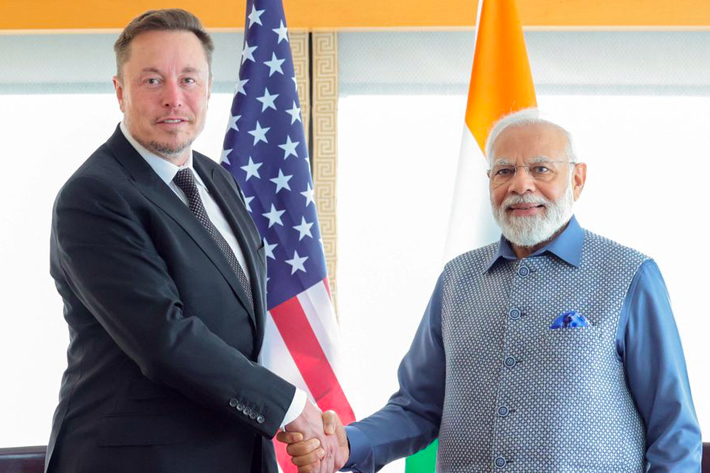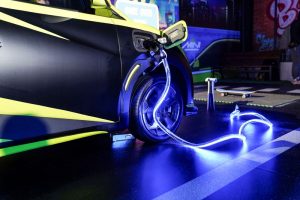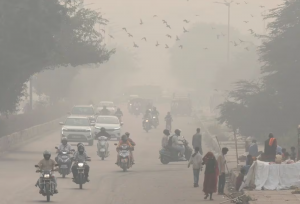India is still far from reaching a final decision on slashing import taxes on electric vehicles — a move it had been mulling to facilitate Tesla’s entry into the country — amid resistance from local carmakers.
The world’s third-largest car market currently imposes a whopping 100% import tax on EVs. But last year, Indian officials began considering lowering that to 15% for automakers that commit to eventually investing and manufacturing in the country.
Officials, however, have still not been able to “take a final call on this so far,“ said Rajesh Kumar Singh, a top bureaucrat at India’s department for industry and trade promotion.
Also on AF: Red Sea Attacks Pose Billions Worth of Risks for China, India
Singh told Reuters at the World Economic Forum meeting in Davos that the delay came on the back of increasing “resistance from domestic industry” which might find itself in direct competition with Elon Musk-owned Tesla if the import tax is lowered.
One of the primary motivators for India to reduce the EV import tax had been Tesla’s interest in building a factory in India.
The US EV giant had said last year that it was interested in producing in India an EV priced at $24,000 — which would be around 25% cheaper than Tesla’s current entry model.
The EV-maker had also called for lower taxes on more expensive models it wants to sell in India.
Tesla would likely try to bring cars to the market in India in the range of $24,000 to $36,000 because they know “that’s where the volumes” will be available, Singh said late on Wednesday.
“The issue is raising resistance from domestic industry because they are also in that (EV price) segment,” he added. “It’s a very contested area.”
‘Level playing field’
While Singh did not name any domestic automakers, India’s Tata Motors and Mahindra & Mahindra have previously pressed officials to not lower EV import taxes.
Mahindra & Mahindra Managing Director Anish Shah called this week in an interview for a level playing field between domestic and foreign EV automakers, saying India must promote local manufacturing.
Separately, Tata — India’s biggest EV player — is also lobbying the Indian government to not cut taxes on hybrid cars such as those from Japan’s Toyota as they are more polluting than pure electrics.
Further incentivisation of hybrids, which are already taxed lower than gasoline cars, “will be a detriment to climate goals and nation’s economy,” Tata wrote in a letter to India’s trade department.
Mahindra & Mahindra and South Korea’s Hyundai Motor, have also asked New Delhi to not reduce taxes on hybrids.
‘Make in India’
Tesla first tried to enter India by demanding lower import taxes, which Elon Musk said were “highest in the world by far of any large country”.
That demand on taxes led to deadlocked talks with New Delhi in 2022. Recently, in a shift in stance, Tesla has offered to set up local manufacturing which India has pushed for.
“There have been some discussions on whether you lower the tariff for a short period of time but he [Musk] also accepts fairly significant investment and domestic value addition criteria,” the Indian official, Singh, told Reuters.
This would allow Tesla to bring in a limited number of vehicles for a short period of time, although Musk would also need to provide “cast iron commitments to invest in India, make in India,” Singh said.
India sold 4 million cars last year, of which just 82,000 were EVs, but the nascent segment clocked sales growth of 115% versus the previous year.
The country is promoting EVs as part of Prime Minister Narendra Modi’s drive to reduce pollution, taxing them at just 5%.
In comparison, the levy is 43% on hybrids and the highest, 48%, on petrol cars.
The government is also trying to deploy proper charging infrastructure across the nation as a lack of that is a key reason that consumers are hesitant to switch to EVs, Singh said.
- Reuters, with additional editing by Vishakha Saxena
Also read:
‘Model 2’ Expected to be One of First Tesla EVs Sold in India
Tesla Seen Looking at Battery Factory in India, as Well as EVs
India in the Running as Location of New Tesla Factory: Musk
Musk Meets Modi, Keen to Bring Tesla, Starlink to India Soon
Tesla Won’t Build a Plant in India Until it Can Sell, Service Cars: Musk
Musk at Odds With Ambani in Plan to Bring Starlink to India
Vietnam’s VinFast ‘Set to Build’ EV Battery Plant in India
























